Reflective Journal: Planning Individual Sessions, Piaget Theory
VerifiedAdded on 2022/10/12
|9
|2314
|22
Journal and Reflective Writing
AI Summary
This reflective journal explores the process of planning individual sessions for 3-year-old children, drawing upon observations of a classroom setting and incorporating the principles of Piaget's theory of cognitive development. The author reflects on the factors that influence lesson planning, such as available space, resources, and the developmental stages of the children. The journal discusses the importance of understanding each child's unique interests and skills, as well as the teacher's role in creating a supportive and engaging learning environment. Key topics include lesson plan preparation, teacher-child ratios, and the application of Piaget's stages of cognitive development (Sensorimotor, Preoperational, Concrete Operational, and Formal Operational) to early childhood education. The author emphasizes the need for teachers to adapt their practices to meet the diverse needs of each child and highlights the significance of teachers as role models and mentors. The journal also covers various techniques and guiding behavior strategies employed by teachers, such as encouraging initiatives, offering praise, and inspiring the class. Furthermore, it delves into behavioral child development theories, focusing on the influence of environmental communication on behavior, and explores classical and operant conditioning. References to relevant research and theories support the reflections and observations.
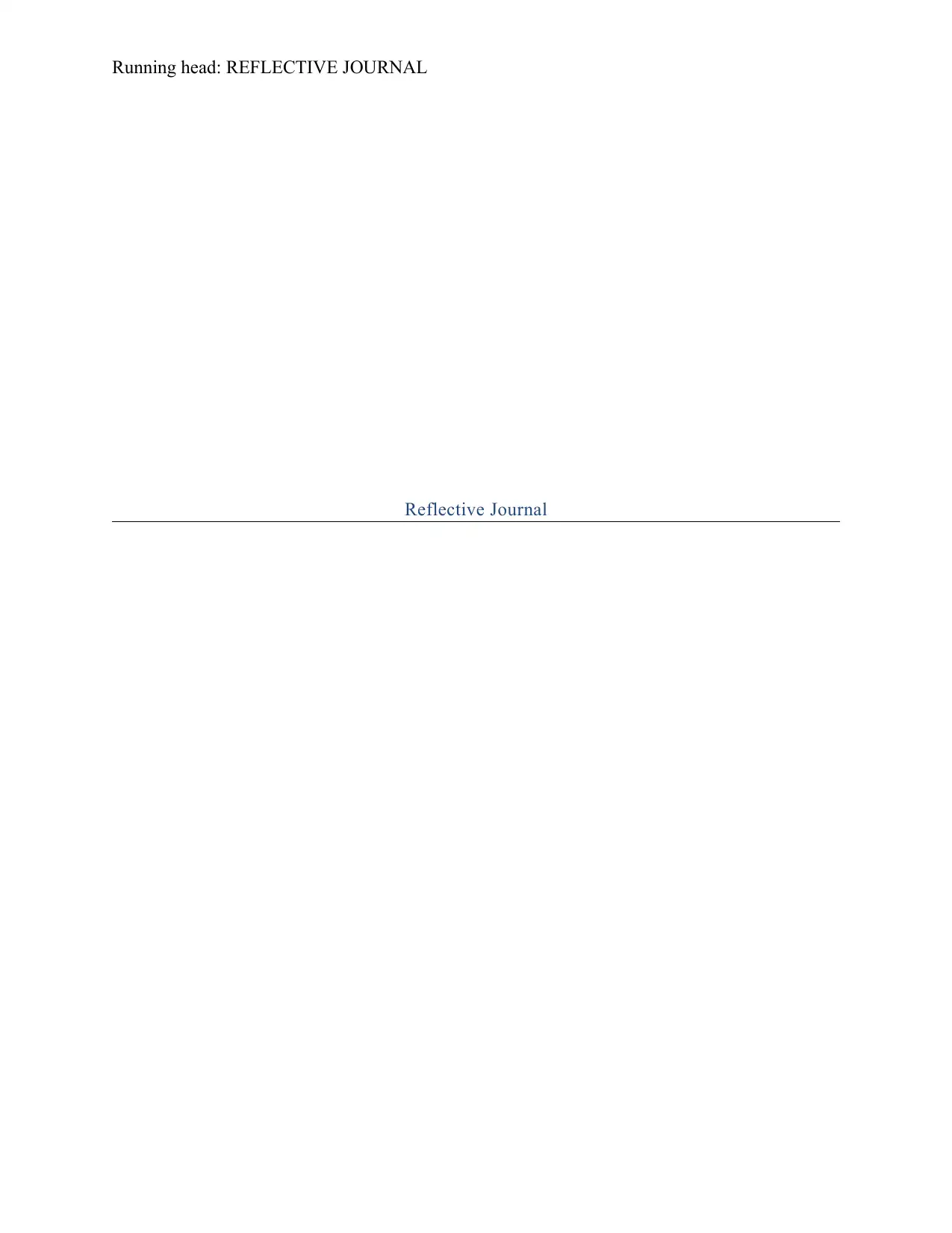
Running head: REFLECTIVE JOURNAL
Reflective Journal
Reflective Journal
Paraphrase This Document
Need a fresh take? Get an instant paraphrase of this document with our AI Paraphraser
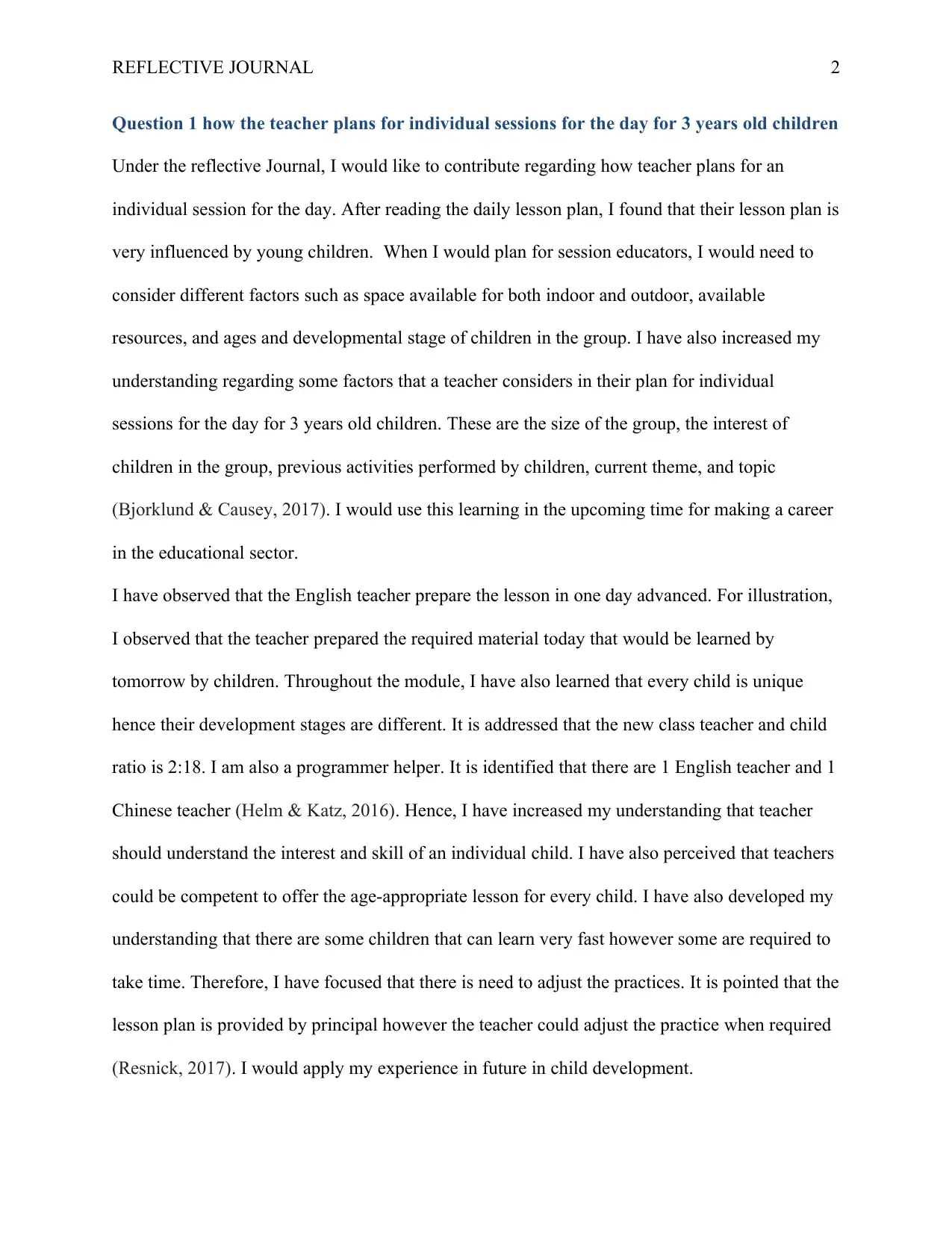
REFLECTIVE JOURNAL 2
Question 1 how the teacher plans for individual sessions for the day for 3 years old children
Under the reflective Journal, I would like to contribute regarding how teacher plans for an
individual session for the day. After reading the daily lesson plan, I found that their lesson plan is
very influenced by young children. When I would plan for session educators, I would need to
consider different factors such as space available for both indoor and outdoor, available
resources, and ages and developmental stage of children in the group. I have also increased my
understanding regarding some factors that a teacher considers in their plan for individual
sessions for the day for 3 years old children. These are the size of the group, the interest of
children in the group, previous activities performed by children, current theme, and topic
(Bjorklund & Causey, 2017). I would use this learning in the upcoming time for making a career
in the educational sector.
I have observed that the English teacher prepare the lesson in one day advanced. For illustration,
I observed that the teacher prepared the required material today that would be learned by
tomorrow by children. Throughout the module, I have also learned that every child is unique
hence their development stages are different. It is addressed that the new class teacher and child
ratio is 2:18. I am also a programmer helper. It is identified that there are 1 English teacher and 1
Chinese teacher (Helm & Katz, 2016). Hence, I have increased my understanding that teacher
should understand the interest and skill of an individual child. I have also perceived that teachers
could be competent to offer the age-appropriate lesson for every child. I have also developed my
understanding that there are some children that can learn very fast however some are required to
take time. Therefore, I have focused that there is need to adjust the practices. It is pointed that the
lesson plan is provided by principal however the teacher could adjust the practice when required
(Resnick, 2017). I would apply my experience in future in child development.
Question 1 how the teacher plans for individual sessions for the day for 3 years old children
Under the reflective Journal, I would like to contribute regarding how teacher plans for an
individual session for the day. After reading the daily lesson plan, I found that their lesson plan is
very influenced by young children. When I would plan for session educators, I would need to
consider different factors such as space available for both indoor and outdoor, available
resources, and ages and developmental stage of children in the group. I have also increased my
understanding regarding some factors that a teacher considers in their plan for individual
sessions for the day for 3 years old children. These are the size of the group, the interest of
children in the group, previous activities performed by children, current theme, and topic
(Bjorklund & Causey, 2017). I would use this learning in the upcoming time for making a career
in the educational sector.
I have observed that the English teacher prepare the lesson in one day advanced. For illustration,
I observed that the teacher prepared the required material today that would be learned by
tomorrow by children. Throughout the module, I have also learned that every child is unique
hence their development stages are different. It is addressed that the new class teacher and child
ratio is 2:18. I am also a programmer helper. It is identified that there are 1 English teacher and 1
Chinese teacher (Helm & Katz, 2016). Hence, I have increased my understanding that teacher
should understand the interest and skill of an individual child. I have also perceived that teachers
could be competent to offer the age-appropriate lesson for every child. I have also developed my
understanding that there are some children that can learn very fast however some are required to
take time. Therefore, I have focused that there is need to adjust the practices. It is pointed that the
lesson plan is provided by principal however the teacher could adjust the practice when required
(Resnick, 2017). I would apply my experience in future in child development.
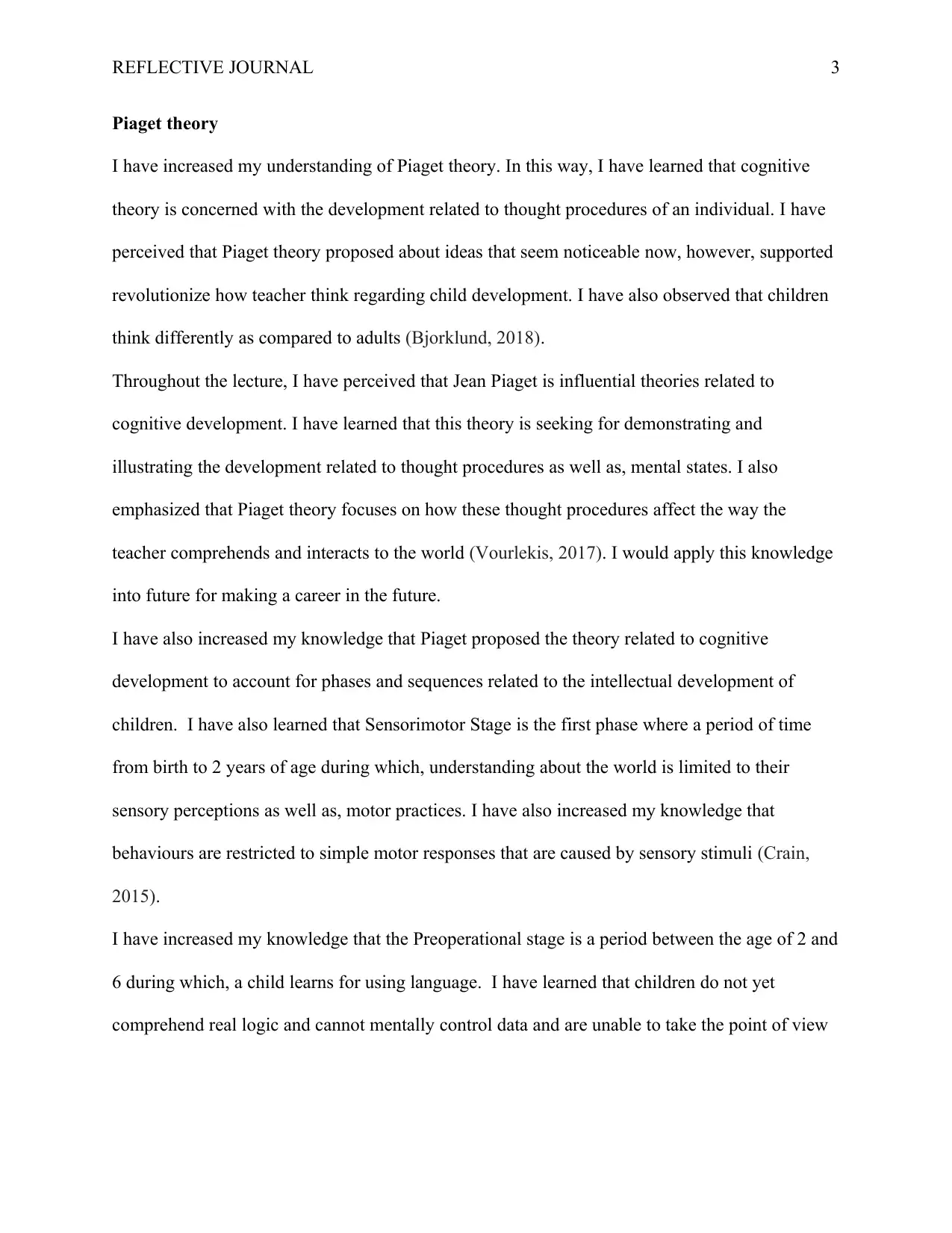
REFLECTIVE JOURNAL 3
Piaget theory
I have increased my understanding of Piaget theory. In this way, I have learned that cognitive
theory is concerned with the development related to thought procedures of an individual. I have
perceived that Piaget theory proposed about ideas that seem noticeable now, however, supported
revolutionize how teacher think regarding child development. I have also observed that children
think differently as compared to adults (Bjorklund, 2018).
Throughout the lecture, I have perceived that Jean Piaget is influential theories related to
cognitive development. I have learned that this theory is seeking for demonstrating and
illustrating the development related to thought procedures as well as, mental states. I also
emphasized that Piaget theory focuses on how these thought procedures affect the way the
teacher comprehends and interacts to the world (Vourlekis, 2017). I would apply this knowledge
into future for making a career in the future.
I have also increased my knowledge that Piaget proposed the theory related to cognitive
development to account for phases and sequences related to the intellectual development of
children. I have also learned that Sensorimotor Stage is the first phase where a period of time
from birth to 2 years of age during which, understanding about the world is limited to their
sensory perceptions as well as, motor practices. I have also increased my knowledge that
behaviours are restricted to simple motor responses that are caused by sensory stimuli (Crain,
2015).
I have increased my knowledge that the Preoperational stage is a period between the age of 2 and
6 during which, a child learns for using language. I have learned that children do not yet
comprehend real logic and cannot mentally control data and are unable to take the point of view
Piaget theory
I have increased my understanding of Piaget theory. In this way, I have learned that cognitive
theory is concerned with the development related to thought procedures of an individual. I have
perceived that Piaget theory proposed about ideas that seem noticeable now, however, supported
revolutionize how teacher think regarding child development. I have also observed that children
think differently as compared to adults (Bjorklund, 2018).
Throughout the lecture, I have perceived that Jean Piaget is influential theories related to
cognitive development. I have learned that this theory is seeking for demonstrating and
illustrating the development related to thought procedures as well as, mental states. I also
emphasized that Piaget theory focuses on how these thought procedures affect the way the
teacher comprehends and interacts to the world (Vourlekis, 2017). I would apply this knowledge
into future for making a career in the future.
I have also increased my knowledge that Piaget proposed the theory related to cognitive
development to account for phases and sequences related to the intellectual development of
children. I have also learned that Sensorimotor Stage is the first phase where a period of time
from birth to 2 years of age during which, understanding about the world is limited to their
sensory perceptions as well as, motor practices. I have also increased my knowledge that
behaviours are restricted to simple motor responses that are caused by sensory stimuli (Crain,
2015).
I have increased my knowledge that the Preoperational stage is a period between the age of 2 and
6 during which, a child learns for using language. I have learned that children do not yet
comprehend real logic and cannot mentally control data and are unable to take the point of view
⊘ This is a preview!⊘
Do you want full access?
Subscribe today to unlock all pages.

Trusted by 1+ million students worldwide
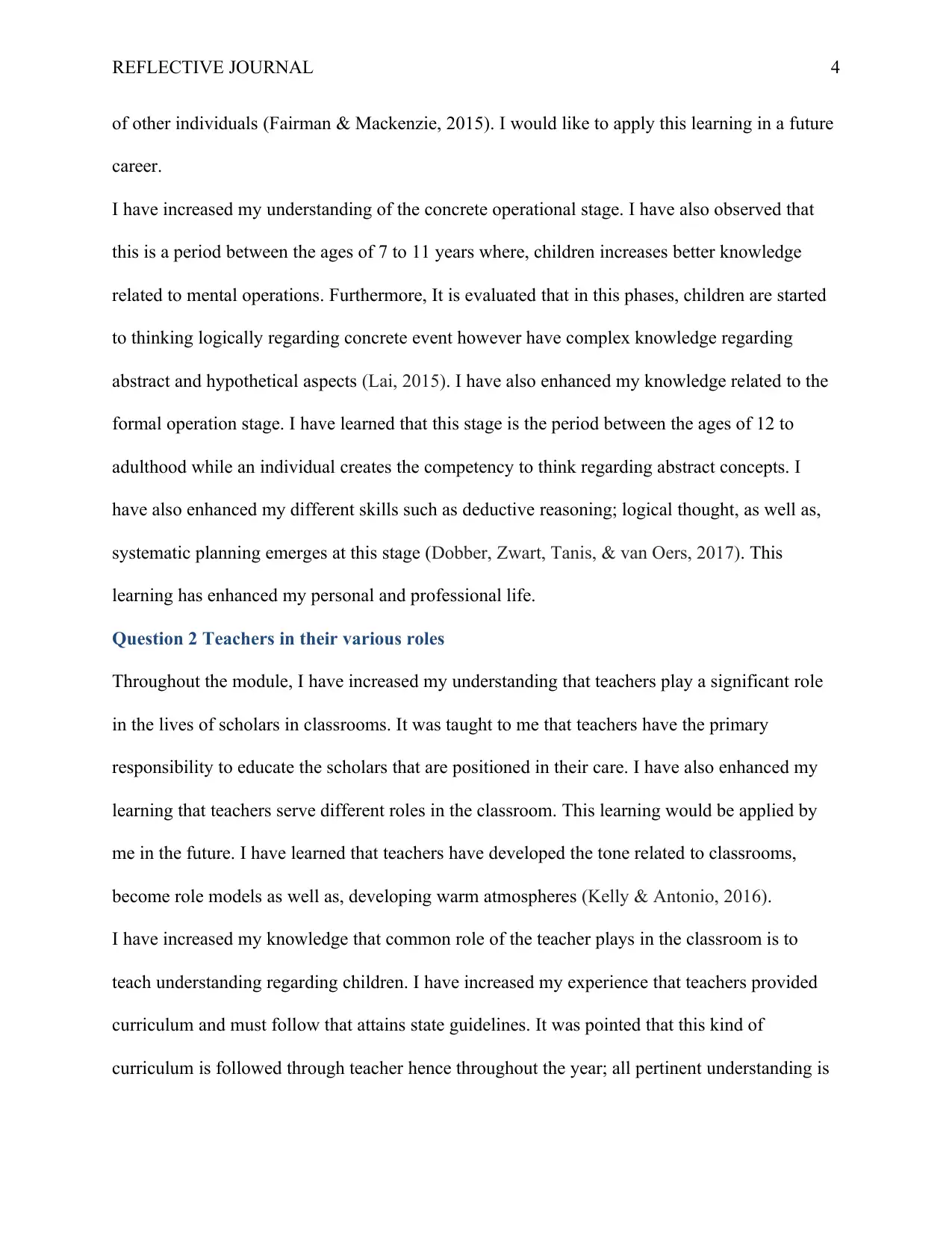
REFLECTIVE JOURNAL 4
of other individuals (Fairman & Mackenzie, 2015). I would like to apply this learning in a future
career.
I have increased my understanding of the concrete operational stage. I have also observed that
this is a period between the ages of 7 to 11 years where, children increases better knowledge
related to mental operations. Furthermore, It is evaluated that in this phases, children are started
to thinking logically regarding concrete event however have complex knowledge regarding
abstract and hypothetical aspects (Lai, 2015). I have also enhanced my knowledge related to the
formal operation stage. I have learned that this stage is the period between the ages of 12 to
adulthood while an individual creates the competency to think regarding abstract concepts. I
have also enhanced my different skills such as deductive reasoning; logical thought, as well as,
systematic planning emerges at this stage (Dobber, Zwart, Tanis, & van Oers, 2017). This
learning has enhanced my personal and professional life.
Question 2 Teachers in their various roles
Throughout the module, I have increased my understanding that teachers play a significant role
in the lives of scholars in classrooms. It was taught to me that teachers have the primary
responsibility to educate the scholars that are positioned in their care. I have also enhanced my
learning that teachers serve different roles in the classroom. This learning would be applied by
me in the future. I have learned that teachers have developed the tone related to classrooms,
become role models as well as, developing warm atmospheres (Kelly & Antonio, 2016).
I have increased my knowledge that common role of the teacher plays in the classroom is to
teach understanding regarding children. I have increased my experience that teachers provided
curriculum and must follow that attains state guidelines. It was pointed that this kind of
curriculum is followed through teacher hence throughout the year; all pertinent understanding is
of other individuals (Fairman & Mackenzie, 2015). I would like to apply this learning in a future
career.
I have increased my understanding of the concrete operational stage. I have also observed that
this is a period between the ages of 7 to 11 years where, children increases better knowledge
related to mental operations. Furthermore, It is evaluated that in this phases, children are started
to thinking logically regarding concrete event however have complex knowledge regarding
abstract and hypothetical aspects (Lai, 2015). I have also enhanced my knowledge related to the
formal operation stage. I have learned that this stage is the period between the ages of 12 to
adulthood while an individual creates the competency to think regarding abstract concepts. I
have also enhanced my different skills such as deductive reasoning; logical thought, as well as,
systematic planning emerges at this stage (Dobber, Zwart, Tanis, & van Oers, 2017). This
learning has enhanced my personal and professional life.
Question 2 Teachers in their various roles
Throughout the module, I have increased my understanding that teachers play a significant role
in the lives of scholars in classrooms. It was taught to me that teachers have the primary
responsibility to educate the scholars that are positioned in their care. I have also enhanced my
learning that teachers serve different roles in the classroom. This learning would be applied by
me in the future. I have learned that teachers have developed the tone related to classrooms,
become role models as well as, developing warm atmospheres (Kelly & Antonio, 2016).
I have increased my knowledge that common role of the teacher plays in the classroom is to
teach understanding regarding children. I have increased my experience that teachers provided
curriculum and must follow that attains state guidelines. It was pointed that this kind of
curriculum is followed through teacher hence throughout the year; all pertinent understanding is
Paraphrase This Document
Need a fresh take? Get an instant paraphrase of this document with our AI Paraphraser
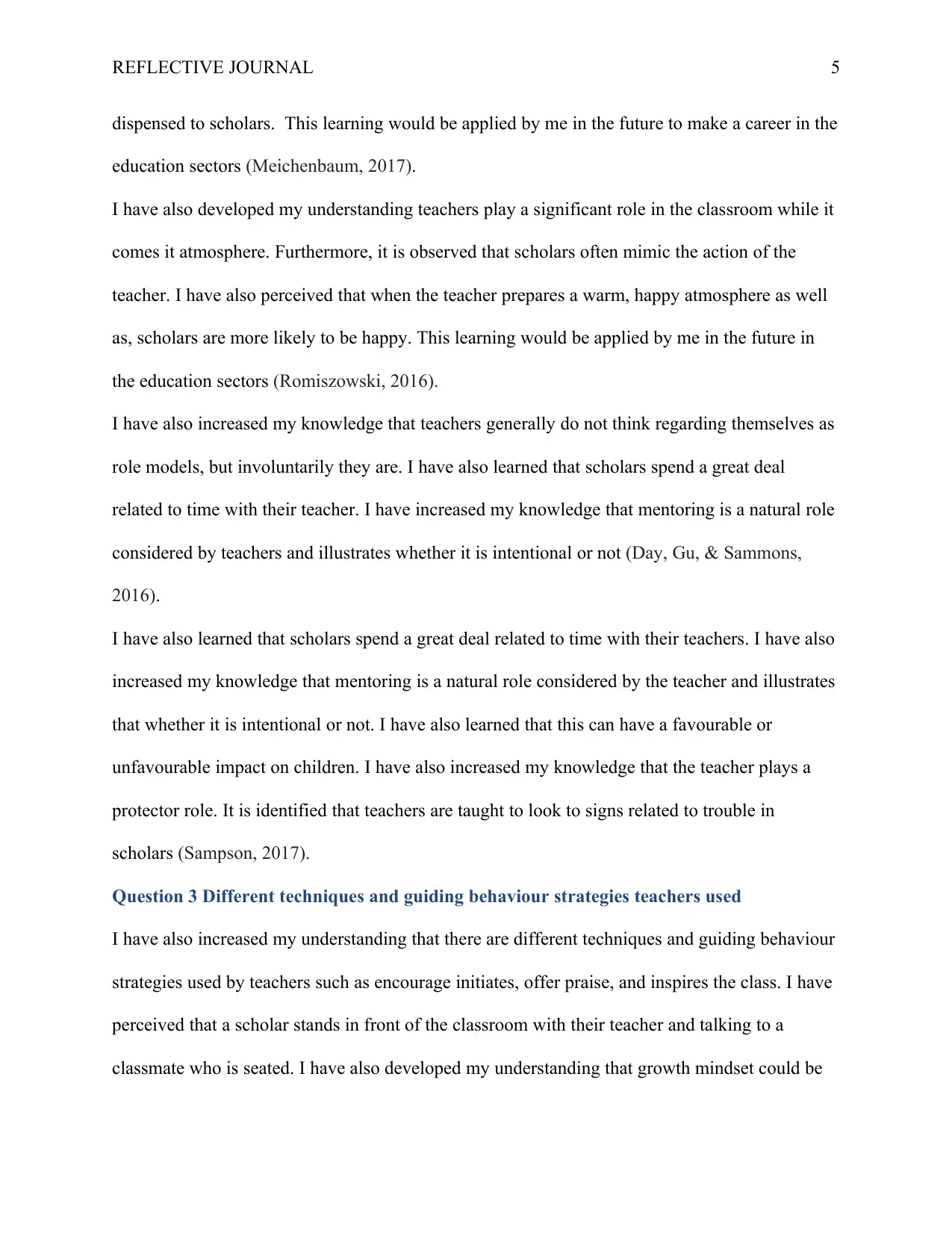
REFLECTIVE JOURNAL 5
dispensed to scholars. This learning would be applied by me in the future to make a career in the
education sectors (Meichenbaum, 2017).
I have also developed my understanding teachers play a significant role in the classroom while it
comes it atmosphere. Furthermore, it is observed that scholars often mimic the action of the
teacher. I have also perceived that when the teacher prepares a warm, happy atmosphere as well
as, scholars are more likely to be happy. This learning would be applied by me in the future in
the education sectors (Romiszowski, 2016).
I have also increased my knowledge that teachers generally do not think regarding themselves as
role models, but involuntarily they are. I have also learned that scholars spend a great deal
related to time with their teacher. I have increased my knowledge that mentoring is a natural role
considered by teachers and illustrates whether it is intentional or not (Day, Gu, & Sammons,
2016).
I have also learned that scholars spend a great deal related to time with their teachers. I have also
increased my knowledge that mentoring is a natural role considered by the teacher and illustrates
that whether it is intentional or not. I have also learned that this can have a favourable or
unfavourable impact on children. I have also increased my knowledge that the teacher plays a
protector role. It is identified that teachers are taught to look to signs related to trouble in
scholars (Sampson, 2017).
Question 3 Different techniques and guiding behaviour strategies teachers used
I have also increased my understanding that there are different techniques and guiding behaviour
strategies used by teachers such as encourage initiates, offer praise, and inspires the class. I have
perceived that a scholar stands in front of the classroom with their teacher and talking to a
classmate who is seated. I have also developed my understanding that growth mindset could be
dispensed to scholars. This learning would be applied by me in the future to make a career in the
education sectors (Meichenbaum, 2017).
I have also developed my understanding teachers play a significant role in the classroom while it
comes it atmosphere. Furthermore, it is observed that scholars often mimic the action of the
teacher. I have also perceived that when the teacher prepares a warm, happy atmosphere as well
as, scholars are more likely to be happy. This learning would be applied by me in the future in
the education sectors (Romiszowski, 2016).
I have also increased my knowledge that teachers generally do not think regarding themselves as
role models, but involuntarily they are. I have also learned that scholars spend a great deal
related to time with their teacher. I have increased my knowledge that mentoring is a natural role
considered by teachers and illustrates whether it is intentional or not (Day, Gu, & Sammons,
2016).
I have also learned that scholars spend a great deal related to time with their teachers. I have also
increased my knowledge that mentoring is a natural role considered by the teacher and illustrates
that whether it is intentional or not. I have also learned that this can have a favourable or
unfavourable impact on children. I have also increased my knowledge that the teacher plays a
protector role. It is identified that teachers are taught to look to signs related to trouble in
scholars (Sampson, 2017).
Question 3 Different techniques and guiding behaviour strategies teachers used
I have also increased my understanding that there are different techniques and guiding behaviour
strategies used by teachers such as encourage initiates, offer praise, and inspires the class. I have
perceived that a scholar stands in front of the classroom with their teacher and talking to a
classmate who is seated. I have also developed my understanding that growth mindset could be
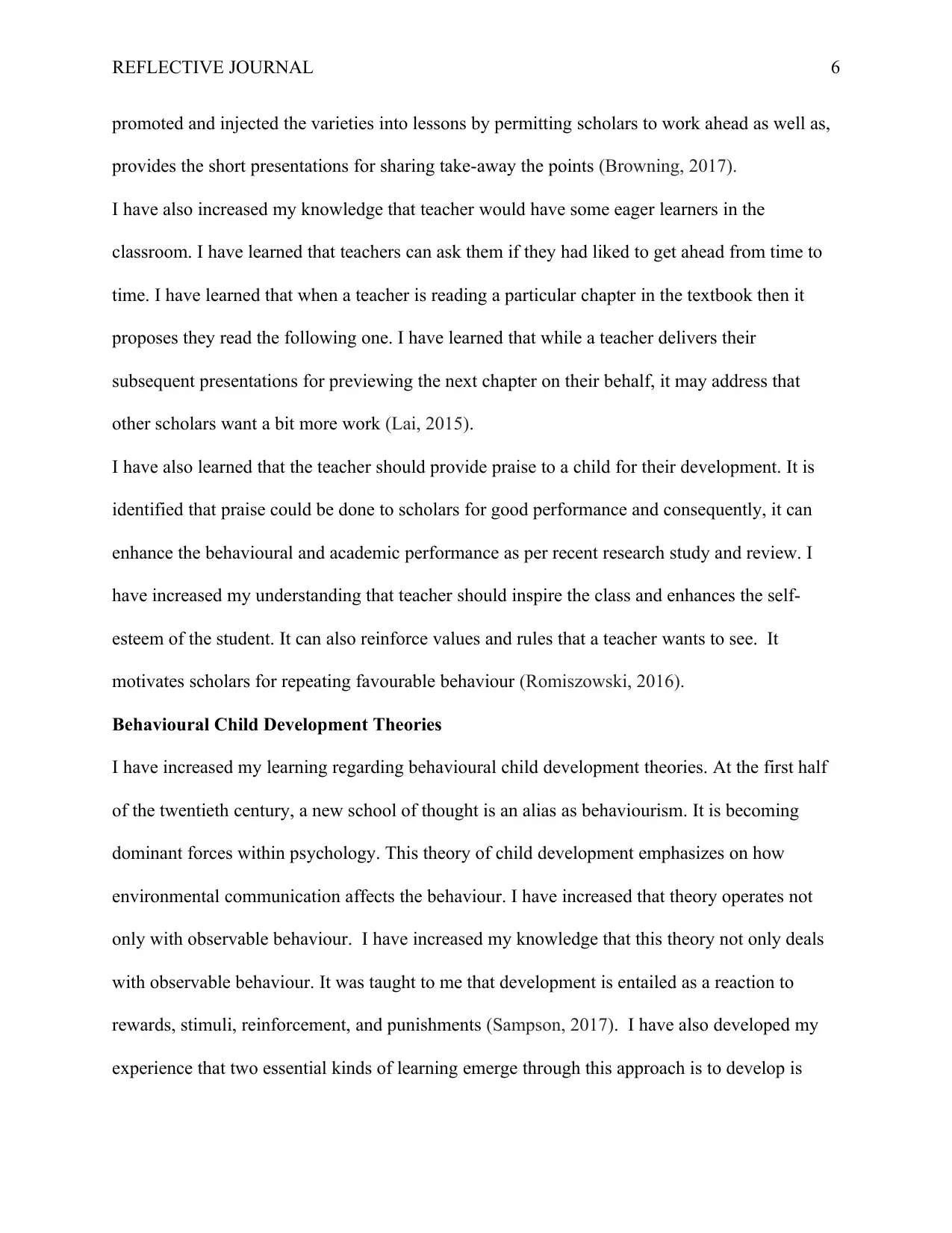
REFLECTIVE JOURNAL 6
promoted and injected the varieties into lessons by permitting scholars to work ahead as well as,
provides the short presentations for sharing take-away the points (Browning, 2017).
I have also increased my knowledge that teacher would have some eager learners in the
classroom. I have learned that teachers can ask them if they had liked to get ahead from time to
time. I have learned that when a teacher is reading a particular chapter in the textbook then it
proposes they read the following one. I have learned that while a teacher delivers their
subsequent presentations for previewing the next chapter on their behalf, it may address that
other scholars want a bit more work (Lai, 2015).
I have also learned that the teacher should provide praise to a child for their development. It is
identified that praise could be done to scholars for good performance and consequently, it can
enhance the behavioural and academic performance as per recent research study and review. I
have increased my understanding that teacher should inspire the class and enhances the self-
esteem of the student. It can also reinforce values and rules that a teacher wants to see. It
motivates scholars for repeating favourable behaviour (Romiszowski, 2016).
Behavioural Child Development Theories
I have increased my learning regarding behavioural child development theories. At the first half
of the twentieth century, a new school of thought is an alias as behaviourism. It is becoming
dominant forces within psychology. This theory of child development emphasizes on how
environmental communication affects the behaviour. I have increased that theory operates not
only with observable behaviour. I have increased my knowledge that this theory not only deals
with observable behaviour. It was taught to me that development is entailed as a reaction to
rewards, stimuli, reinforcement, and punishments (Sampson, 2017). I have also developed my
experience that two essential kinds of learning emerge through this approach is to develop is
promoted and injected the varieties into lessons by permitting scholars to work ahead as well as,
provides the short presentations for sharing take-away the points (Browning, 2017).
I have also increased my knowledge that teacher would have some eager learners in the
classroom. I have learned that teachers can ask them if they had liked to get ahead from time to
time. I have learned that when a teacher is reading a particular chapter in the textbook then it
proposes they read the following one. I have learned that while a teacher delivers their
subsequent presentations for previewing the next chapter on their behalf, it may address that
other scholars want a bit more work (Lai, 2015).
I have also learned that the teacher should provide praise to a child for their development. It is
identified that praise could be done to scholars for good performance and consequently, it can
enhance the behavioural and academic performance as per recent research study and review. I
have increased my understanding that teacher should inspire the class and enhances the self-
esteem of the student. It can also reinforce values and rules that a teacher wants to see. It
motivates scholars for repeating favourable behaviour (Romiszowski, 2016).
Behavioural Child Development Theories
I have increased my learning regarding behavioural child development theories. At the first half
of the twentieth century, a new school of thought is an alias as behaviourism. It is becoming
dominant forces within psychology. This theory of child development emphasizes on how
environmental communication affects the behaviour. I have increased that theory operates not
only with observable behaviour. I have increased my knowledge that this theory not only deals
with observable behaviour. It was taught to me that development is entailed as a reaction to
rewards, stimuli, reinforcement, and punishments (Sampson, 2017). I have also developed my
experience that two essential kinds of learning emerge through this approach is to develop is
⊘ This is a preview!⊘
Do you want full access?
Subscribe today to unlock all pages.

Trusted by 1+ million students worldwide
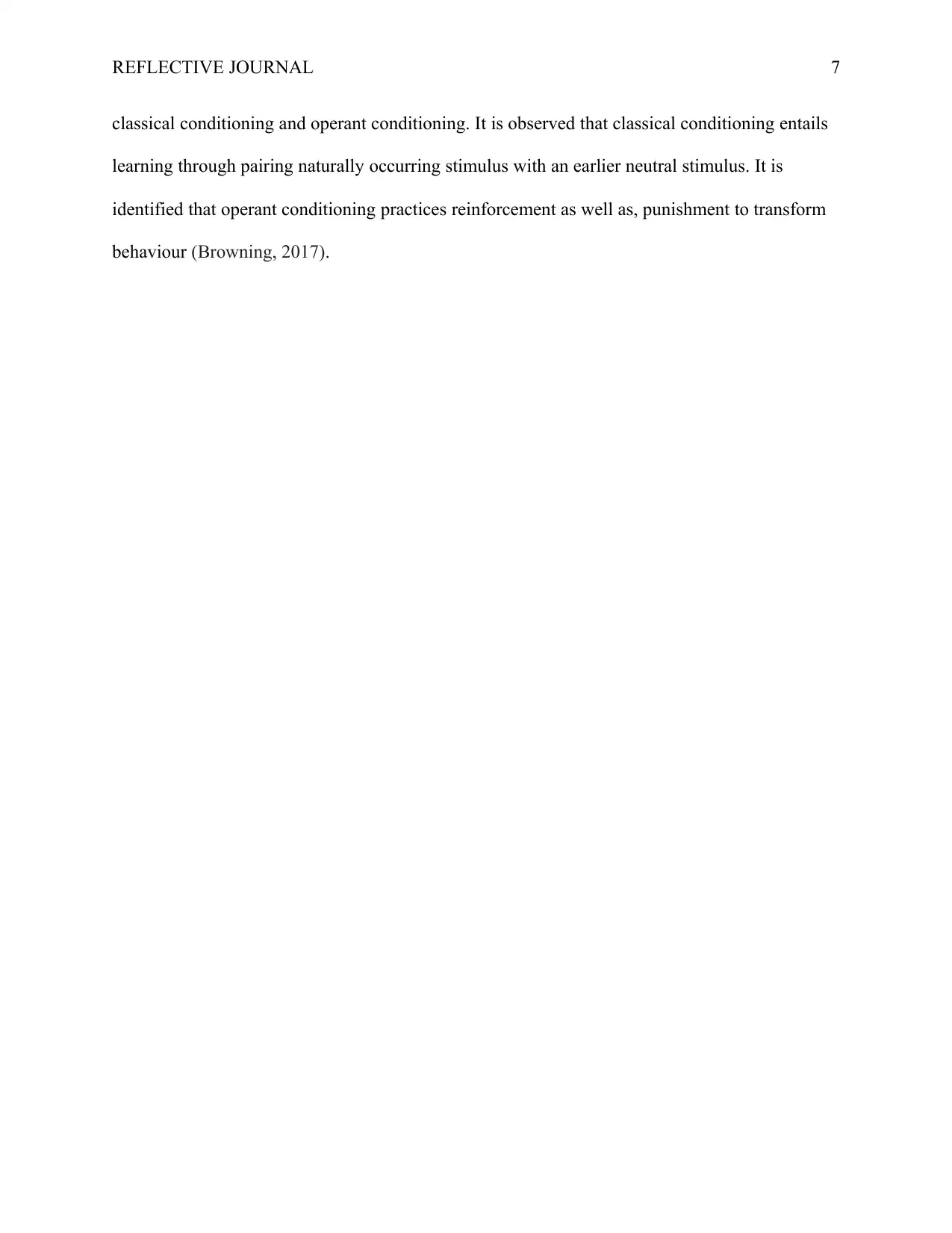
REFLECTIVE JOURNAL 7
classical conditioning and operant conditioning. It is observed that classical conditioning entails
learning through pairing naturally occurring stimulus with an earlier neutral stimulus. It is
identified that operant conditioning practices reinforcement as well as, punishment to transform
behaviour (Browning, 2017).
classical conditioning and operant conditioning. It is observed that classical conditioning entails
learning through pairing naturally occurring stimulus with an earlier neutral stimulus. It is
identified that operant conditioning practices reinforcement as well as, punishment to transform
behaviour (Browning, 2017).
Paraphrase This Document
Need a fresh take? Get an instant paraphrase of this document with our AI Paraphraser
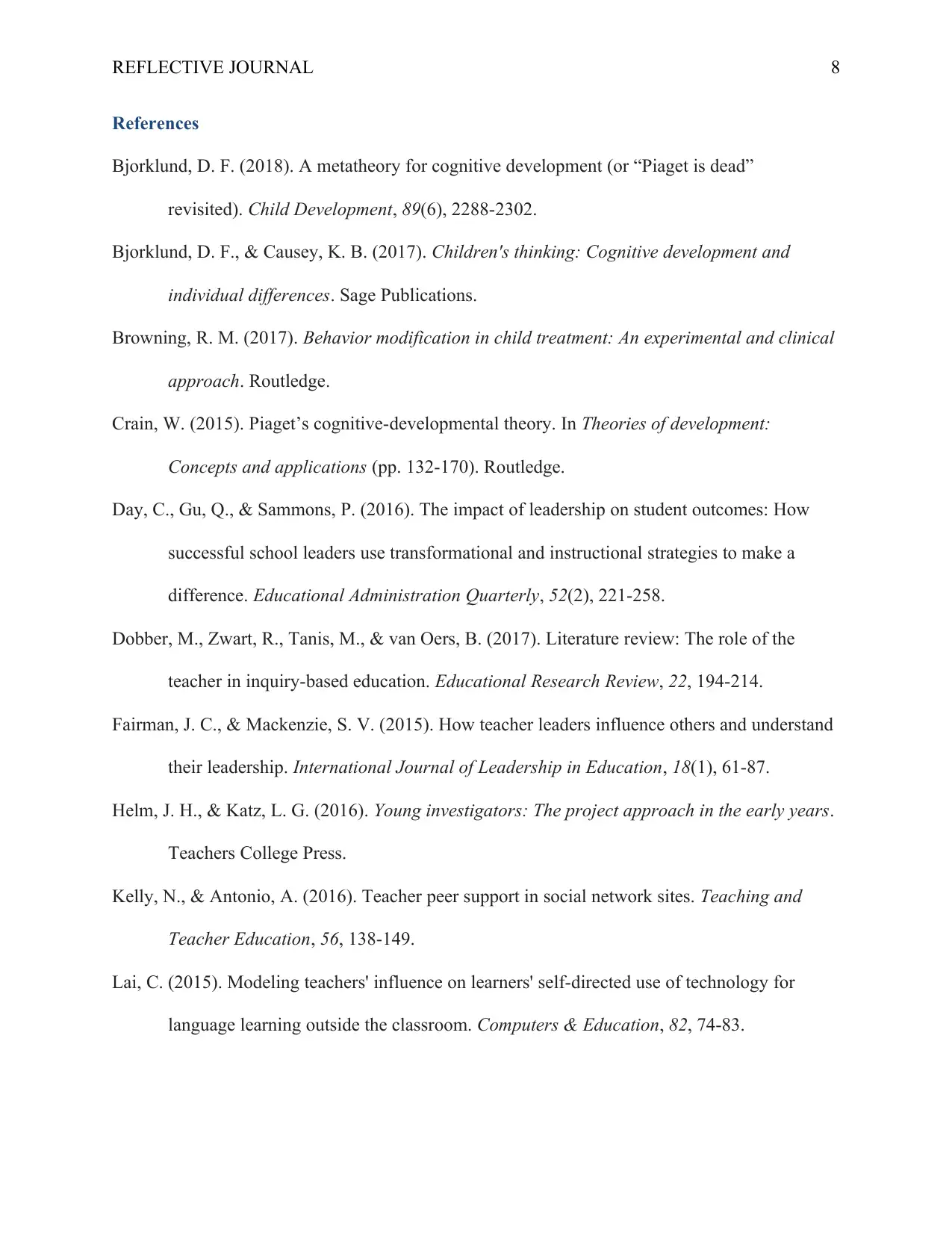
REFLECTIVE JOURNAL 8
References
Bjorklund, D. F. (2018). A metatheory for cognitive development (or “Piaget is dead”
revisited). Child Development, 89(6), 2288-2302.
Bjorklund, D. F., & Causey, K. B. (2017). Children's thinking: Cognitive development and
individual differences. Sage Publications.
Browning, R. M. (2017). Behavior modification in child treatment: An experimental and clinical
approach. Routledge.
Crain, W. (2015). Piaget’s cognitive-developmental theory. In Theories of development:
Concepts and applications (pp. 132-170). Routledge.
Day, C., Gu, Q., & Sammons, P. (2016). The impact of leadership on student outcomes: How
successful school leaders use transformational and instructional strategies to make a
difference. Educational Administration Quarterly, 52(2), 221-258.
Dobber, M., Zwart, R., Tanis, M., & van Oers, B. (2017). Literature review: The role of the
teacher in inquiry-based education. Educational Research Review, 22, 194-214.
Fairman, J. C., & Mackenzie, S. V. (2015). How teacher leaders influence others and understand
their leadership. International Journal of Leadership in Education, 18(1), 61-87.
Helm, J. H., & Katz, L. G. (2016). Young investigators: The project approach in the early years.
Teachers College Press.
Kelly, N., & Antonio, A. (2016). Teacher peer support in social network sites. Teaching and
Teacher Education, 56, 138-149.
Lai, C. (2015). Modeling teachers' influence on learners' self-directed use of technology for
language learning outside the classroom. Computers & Education, 82, 74-83.
References
Bjorklund, D. F. (2018). A metatheory for cognitive development (or “Piaget is dead”
revisited). Child Development, 89(6), 2288-2302.
Bjorklund, D. F., & Causey, K. B. (2017). Children's thinking: Cognitive development and
individual differences. Sage Publications.
Browning, R. M. (2017). Behavior modification in child treatment: An experimental and clinical
approach. Routledge.
Crain, W. (2015). Piaget’s cognitive-developmental theory. In Theories of development:
Concepts and applications (pp. 132-170). Routledge.
Day, C., Gu, Q., & Sammons, P. (2016). The impact of leadership on student outcomes: How
successful school leaders use transformational and instructional strategies to make a
difference. Educational Administration Quarterly, 52(2), 221-258.
Dobber, M., Zwart, R., Tanis, M., & van Oers, B. (2017). Literature review: The role of the
teacher in inquiry-based education. Educational Research Review, 22, 194-214.
Fairman, J. C., & Mackenzie, S. V. (2015). How teacher leaders influence others and understand
their leadership. International Journal of Leadership in Education, 18(1), 61-87.
Helm, J. H., & Katz, L. G. (2016). Young investigators: The project approach in the early years.
Teachers College Press.
Kelly, N., & Antonio, A. (2016). Teacher peer support in social network sites. Teaching and
Teacher Education, 56, 138-149.
Lai, C. (2015). Modeling teachers' influence on learners' self-directed use of technology for
language learning outside the classroom. Computers & Education, 82, 74-83.
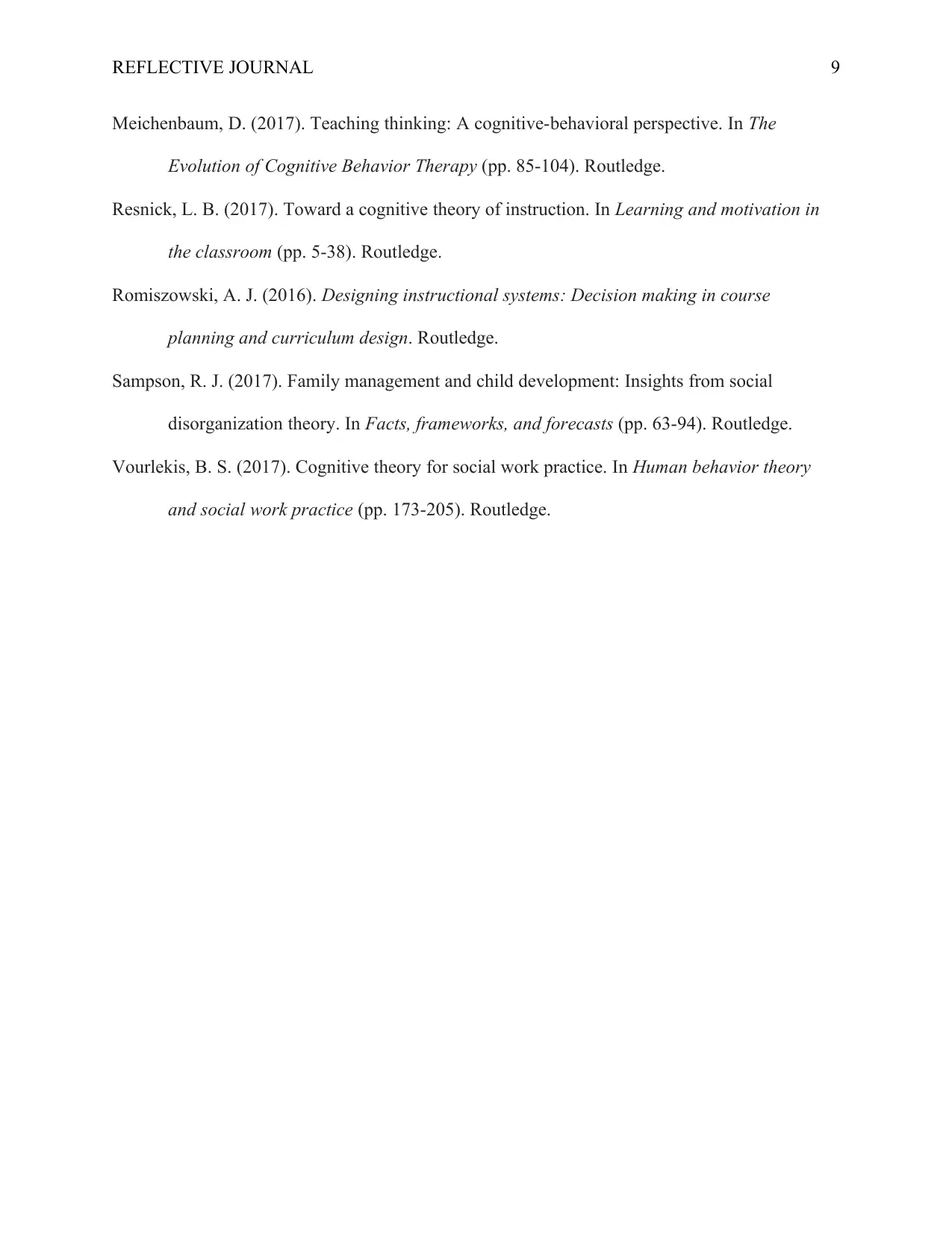
REFLECTIVE JOURNAL 9
Meichenbaum, D. (2017). Teaching thinking: A cognitive-behavioral perspective. In The
Evolution of Cognitive Behavior Therapy (pp. 85-104). Routledge.
Resnick, L. B. (2017). Toward a cognitive theory of instruction. In Learning and motivation in
the classroom (pp. 5-38). Routledge.
Romiszowski, A. J. (2016). Designing instructional systems: Decision making in course
planning and curriculum design. Routledge.
Sampson, R. J. (2017). Family management and child development: Insights from social
disorganization theory. In Facts, frameworks, and forecasts (pp. 63-94). Routledge.
Vourlekis, B. S. (2017). Cognitive theory for social work practice. In Human behavior theory
and social work practice (pp. 173-205). Routledge.
Meichenbaum, D. (2017). Teaching thinking: A cognitive-behavioral perspective. In The
Evolution of Cognitive Behavior Therapy (pp. 85-104). Routledge.
Resnick, L. B. (2017). Toward a cognitive theory of instruction. In Learning and motivation in
the classroom (pp. 5-38). Routledge.
Romiszowski, A. J. (2016). Designing instructional systems: Decision making in course
planning and curriculum design. Routledge.
Sampson, R. J. (2017). Family management and child development: Insights from social
disorganization theory. In Facts, frameworks, and forecasts (pp. 63-94). Routledge.
Vourlekis, B. S. (2017). Cognitive theory for social work practice. In Human behavior theory
and social work practice (pp. 173-205). Routledge.
⊘ This is a preview!⊘
Do you want full access?
Subscribe today to unlock all pages.

Trusted by 1+ million students worldwide
1 out of 9
Related Documents
Your All-in-One AI-Powered Toolkit for Academic Success.
+13062052269
info@desklib.com
Available 24*7 on WhatsApp / Email
![[object Object]](/_next/static/media/star-bottom.7253800d.svg)
Unlock your academic potential
Copyright © 2020–2025 A2Z Services. All Rights Reserved. Developed and managed by ZUCOL.





